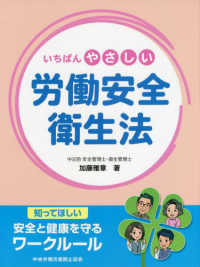Full Description
This book investigates how educators and researchers in the sciences, social sciences, and the arts, connect concepts of sustainability to work in their fields of study and in the classrooms where they teach the next generation. Sustainability, with a focus on justice, authenticity and inclusivity, can be integrated into many different courses or disciplines even if it is beyond their historical focus. The narratives describe sustainability education in the classroom, the laboratory, and the field (broadly defined) and how the authors navigate the complexities of particular sustainability issues, such as climate change, water quality, soil health, biodiversity, resource use, and education in authentic ways that convey their complexity, the sociopolitical context, and their hopes for the future. The chapters explore how faculty engage students in learning about sustainability and the ways in which working at the edge of what we know about sustainability can be a significant source ofengagement, motivation, and challenge. The authors discuss how they create learning experiences that foster democratic practices in which students are not just following protocols, but have a stake in creative decision-making, collecting and analysing data, and posing authentic questions. They also describe what happens when students are not just passively receiving information, but actively analysing, debating, dialoguing, arguing from evidence, and constructing nuanced understandings of complex socioscientific sustainability issues. The narratives include undergraduate student perspectives on what it means to engage in sustainability research and learning, how students navigate the complexities and contradictions inherent in sustainability issues, what makes for authentic, empowering learning experiences, and how students are encouraged to persevere in the field.
This is an open access book.
Contents
Introduction.- Part I: Framing and reframing sustainability.- Chapter 1. Sustainability, research, and the undergraduate science curriculum (Maria S. Rivera Maulucci).- Chapter 2. Ecology's White nationalism problem (Ralph Ghoche, Unyimeabasi Udoh).- Part II: Environmental justice and the undergraduate science curriculum.- Chapter 3. Teaching chemistry in context: Environmental lead exposure - quantification and interpretation (Rachel Narehood Austin).- Chapter 4. What does cell biology have to do with saving pollinators? (Jonathan Snow).- Chapter 5. Finding the most important places on Earth for birds (Terryanne Maenza-Gmelch).- Chapter 6. Brownfield action: A web-based active learning simulation (Peter Bower).- Part III: Undergraduate students, sustainability, and health in the urban environment.- Chapter 7. What We Make and What We Use: Environmental Impacts of Reuse in Design and Production (Sandra Goldmark).- Chapter 8. It turned into a BioBlitz: urban data collection for understanding and connection (Kelly O'Donnell).- Chapter 9. Going up: Incorporating the local ecology of New York City green infrastructure into biology laboratory courses (Matthew Rhodes).- Chapter 10. The everyday action project: Teaching hygiene through art (Emma Ruskin).- Part IV: Climate change, politics, students, and the undergraduate curriculum.- Chapter 11. Perspectives on teaching climate change: Two decades of evolving approaches (Stephanie Pfirman).- Chapter 12. Moved to teach beyond political and geographic polarization (Deborah Becher).- Chapter 13. Volcanoes, climate change, and society (Sedelia Rodriguez).- Chapter 14. Teaching about climate change from an astronomical perspective (Laura Kay).- Chapter 15. Barnard's fossil fuel divestment decision: Aligning endowments with institutional values (Robert Goldberg).- Part V. Ecojustice pedagogies and enhancing college access.- Chapter 16. The UNPAK project: fostering friendships in science (Hilary Callahan).- Chapter 17. Inclusive Pedagogy: Marching from Classroom to Community (Joshua Drew).- Chapter 18. Collaboration, communication, and creativity: Practicing scientific values and skills in Environmental Science classrooms (Mary Heskel).- Chapter 19. Lamont-Doherty Secondary School Field Research Program (Robert Newton).- Chapter 20. The Intercollegiate Partnership: Fostering Future Scientists and Responsible Citizenship through Experiential and Collaborative Learning in Science (Paul E. Hertz).







